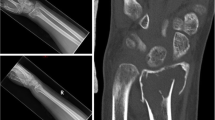Abstract
We present a 67-year-old woman with advanced-stage lung adenocarcinoma (T2N3M1, Stage IV). Palliative surgery with an intramedullary nail was performed for the sudden onset of a pathological fracture of the right proximal femur. Gefitinib, an epidermal growth factor receptor tyrosine kinase inhibitor, administration without radiotherapy for 3 months led to remarkable recovery of the mineralization in the metastatic femoral lesion, in accordance with size reduction of the primary lung tumor. Her serum CEA level markedly decreased. She has remained alive during follow-up for 22 months after the surgery, and has suffered no adverse effects of gefitinib administration other than a skin rash and mild diarrhea. Oral gefitinib administration had an excellent effect on bone repair and mineralization for a pathological fracture of metastatic lung adenocarcinoma.




Similar content being viewed by others
References
Jemal A, Siegel R, Ward E, Murray T et al (2007) Cancer statistics 2007. CA Cancer J Clin 57:43–66
Katagiri H, Takahashi M, Wakai K et al (2005) Prognostic factors and a scoring system for patients with skeletal metastasis. J Bone Joint Surg Br 87:698–703
Nottebaert M, Exner GU, von Hochstetter AR et al (1989) Metastatic bone disease from occult carcinoma: a profile. Int Orthop 13:119–123
Fukuoka M, Yano S, Giaccone G et al (2003) Multi-institutional randomized phase II trial of gefitinib for previously treated patients with advanced non-small-cell lung cancer. J Clin Oncol 21:2237–2246
Lee DH, Han JY, Lee HG et al (2005) Gefitinib as a first-line therapy of advanced or metastatic adenocarcinoma of the lung in never-smokers. Clin Cancer Res 11:3032–3037
Inoue A, Saijo Y, Maemondo M et al (2003) Severe acute interstitial pneumonia and gefitinib. Lancet 361:137–139
Stemmler HJ, Weigert O, Krych M et al (2005) Brain metastases in metastatic non-small cell lung cancer responding to single-agent gefitinib: a case report. Anticancer Drugs 16:747–749
Roggero E, Busi G, Palumbo A et al (2005) A Gefitinib (‘Iressa’, ZD1839) is active against brain metastases in a 77 year old patient. J Neurooncol 71:277–280
Nishi N, Kawai S, Yonezawa T et al (2006) Effect of gefitinib on brain metastases from non-small cell lung cancer. Neurol Med Chir 46:504–507
Ishida A, Kanoh K, Nishisaka T et al (2004) Gefitinib as a first line of therapy in non-small cell lung cancer with brain metastases. Intern Med 43:718–720
Yokouchi H, Yamazaki K, Kinoshita I et al (2007) Clinical benefit of readministration of gefitinib for initial gefitinib-responders with non-small cell lung cancer. BMC Cancer 20:51
Lange T, Muller-Tidow C, Serve H et al (2005) First-line systemic treatment with gefitinib in stage IV non-small cell lung cancer. Oncol Rep 14:1539–1542
Charoentum C (2006) Thai female non-smoker with recurrent lung adenocarcinoma who has dramatic and prolonged response to gefitinib for over one year. J Med Assoc Thai 89:882–886
Hayashi M, Sekikawa A, Saijo A et al (2005) Successful treatment of hypertrophic osteoarthropathy by gefitinib in a case with lung adenocarcinoma. Anticancer Res 25:2435–2438
Gridelli C, Maione P, Galetta D et al (2007) Three cases of long-lasting tumor control with erlotinib after progression with gefitinib in advanced non-small cell lung cancer. J Thorac Oncol 2:758–761
Garfield D (2006) Increasing osteoblastic lesions as a manifestation of a major response to gefitinib. J Thorac Oncol 1:859–860
Saad F, Lipton A, Cook R et al (2007) Pathologic fractures correlate with reduced survival in patients with malignant bone disease. Cancer 110:1860–1867
Angelucci A, Gravina GL, Rucci N et al (2006) Suppression of EGF-R signaling reduces the incidence of prostate cancer metastasis in nude mice. Endocr Relat Cancer 13:197–210
Normanno N, Gullick WJ (2006) Epidermal growth factor receptor tyrosine kinase inhibitors and bone metastases: different mechanisms of action for a novel therapeutic application? Endocr Relat Cancer 13:3–6
Conflict of interest statement
None.
Author information
Authors and Affiliations
Corresponding author
Rights and permissions
About this article
Cite this article
Hoshi, M., Takami, M., Ieguchi, M. et al. Gefitinib is effective for pathological fracture of metastatic non-small cell lung cancer. Eur J Orthop Surg Traumatol 19, 181–185 (2009). https://doi.org/10.1007/s00590-008-0406-6
Received:
Accepted:
Published:
Issue Date:
DOI: https://doi.org/10.1007/s00590-008-0406-6




